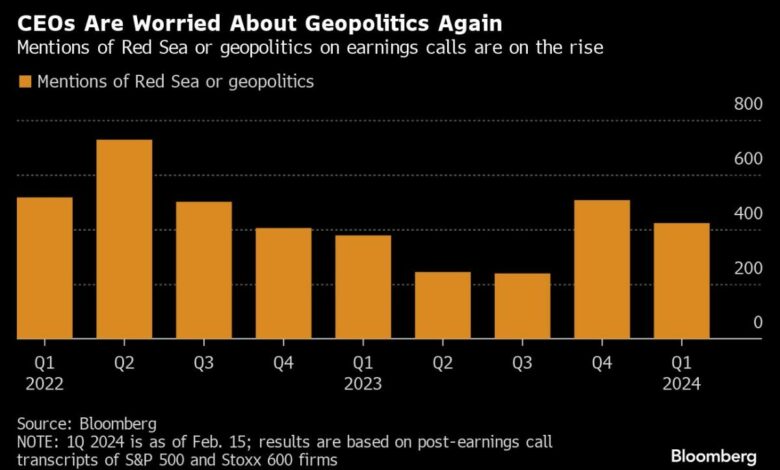Record US Stock Rally Is Under Threat From a World in Turmoil

(Bloomberg) — Investors and firms are flagging that the war in the Middle East poses a major risk for earnings as boycotts dampen sales and Red Sea shipping chaos threatens their supply chains.
Most Read from Bloomberg
Those headwinds pose a danger to the record rally in US stocks, according to a Bloomberg analysis of hundreds of earnings calls. By the halfway mark in the first quarter, the number of references to the Red Sea or “geopolitics” has almost matched the total for the previous three months.
Expectations for profits at S&P 500 companies for the next 12 months are at a record high, suggesting analysts are pricing in a blue-sky scenario with the US economy growing more than expected and the Federal Reserve cutting rates. Any major threat to earnings, or signs that inflation is returning, could impact the months-long rally which has sent the US benchmark to record highs.
Crude prices have already climbed this year in part due to fears the Israel-Hamas war could grow into a wider conflict. At the same time, container ships are being forced to avoid the Red Sea and Suez Canal after attacks by Iran-backed Houthi rebels as part of a campaign against Israel.
“The geopolitical backdrop is a risk,” said Nicole Kornitzer, portfolio manager of the Buffalo International Fund at Kornitzer Capital Management Inc. “If the pressure continues for longer, this could weigh on corporate margins and be inflationary as costs are passed on through price increases. This kind of scenario is not in estimates.”
From consumer goods companies, to social media, to freight firms, Bank of America Corp.’s latest fund manager survey also showed that investors see geopolitics as the second biggest risk to share prices after inflation, although the two dangers are connected — participants expect a further escalation in the Red Sea or Middle East to add new price pressures higher oil and freight rates.
In Europe, alcoholic beverages producer Heineken NV said macroeconomic and geopolitical developments will remain a factor of uncertainty that could impact its business. Adidas AG said tension in the Red Sea is leading to higher supply costs in the short term.
Tesla Inc. in January announced production suspensions at its German plant, citing disruptions in supplies. Medical equipment supplier ResMed Inc. said it’s seeing an impact on freight rates and lead times. Computer networking equipment giant Cisco Systems Inc. also said shipping rates have gone up. Chemicals company Albemarle Corp., tobacco firm Philip Morris International Inc. and rail services provider CSX Corp. are among S&P 500 firms also monitoring the situation in the Red Sea.
Some firms have benefited from the situation. The Dutch firm Royal Vopak NV saw a rise in demand for its storage facilities due to the disruption in the Red Sea and uncertainty in the oil market. A.P. Moller-Maersk A/S had rallied in the lead up to its results, but disappointed after saying it expects renewed gloom in the industry later this year when the current boost to freight rates from the Red Sea conflict evaporates.
Meanwhile, many shoppers in the Middle East as well as Muslim nations like Pakistan are shunning big foreign brands driven by anger against the US and Europe for not doing more to get Israel to end its offensive in Gaza. That’s weighed on the earnings of major US businesses.
Read more: Starbucks, Coke Boycotts Over Gaza War Boost Middle East Rivals
McDonald’s Corp.’s sales missed investor expectations, hurt in part by the boycotts. It expects no meaningful improvement for the segment that includes the region until there’s a resolution to the war, which also hit Starbucks Corp.’s results. Even Snap Inc. sees the conflict as a headwind.
The Israel-Hamas war continues to rage with no end in sight, and the Houthis continue to disrupt shipping in the Red Sea, even as the US and UK are targeting the militant group in Yemen and a multinational naval operation patrols the waters.
“Geopolitics is the tail risk which has the most short-term market impact,” said Rajeev De Mello, a global macro portfolio manager at GAMA.
–With assistance from Sagarika Jaisinghani.
Most Read from Bloomberg Businessweek
©2024 Bloomberg L.P.
Source link




